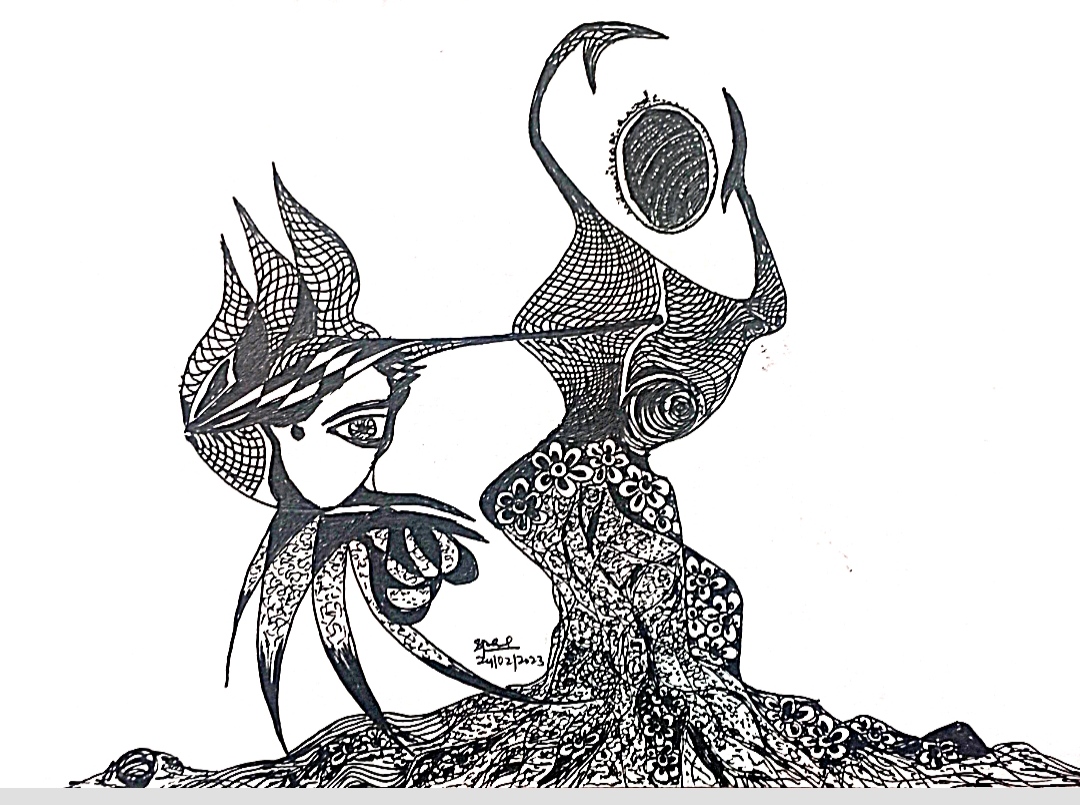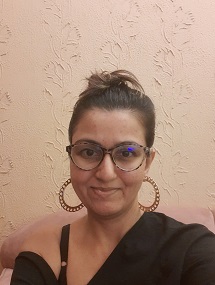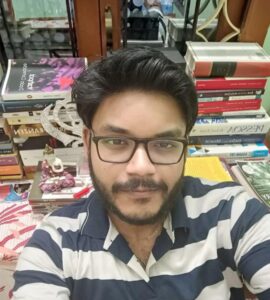
Poetry in Our Time
 Suchita Parikh-Mundul
Suchita Parikh-Mundul
We gather
We gather in a room: strangers, I
among them, like moths
to flame love with the usual cheer.
A gift of money
for a woman I half know
makes its way to her hands and passes
like a parcel to her mother’s, the official
keeper of the evening. In her maternal
lap are also years
of a daughter’s childhood
along with flowers and boxes
we were cautioned not to bring.
Our people do not care
for instructions. The bride
is busy leading us in dance. We become
family momentarily but I
remain an intruder in a celebration
I was invited to as a courtesy
and attended
in much the same spirit.
Meeting an old friend
Years later, after having been
orphaned, after our bodies have
stretched and sagged, we meet
outside a departmental store and
inquire of the other: Are you an
adult yet? Hesitantly, each lost
in our own brand of grief,
we arrange our mouths
in a smile, and reply:
no, despite our eyes having
travelled the clouds where
our gaze often remains.
I switched sides
I switched sides: I now sleep
on the right, where the window,I
don’t mind its stifling
glass. I’m accustomed
to the low drone
of the dark and the cacophony
of sunrise; each brings
gods to the sill. When they
appear with tomorrow
in their hands,
I roll over and make
my escape.
Suchita Parikh-Mundul
works as a writer, copy editor and poet. Some of her articles on gender and culture can be read online at The Swaddle. Her poetry can be found in literary magazines like The Bombay Literary Magazine, Sahitya Akademi’s Indian Literature, Outlook India, and various national and international anthologies.
Suchita Parikh-Mundul works as a writer,  copy editor and poet. Some of her articles on gender and culture can be read online at The Swaddle. Her poetry can be found in literary magazines like The Bombay Literary Magazine, Sahitya Akademi’s Indian Literature, Outlook India, and various national and international anthologies.
copy editor and poet. Some of her articles on gender and culture can be read online at The Swaddle. Her poetry can be found in literary magazines like The Bombay Literary Magazine, Sahitya Akademi’s Indian Literature, Outlook India, and various national and international anthologies.
Koon Woon
You Only Need to Love Me When I Am Old
No need to love me when I am young,
because I can only love myself then.
No need to give yourself under the apple bough,
for any pair of fair arms would as easily me arouse.
But love me, love me when I am old,
when the extremities of me grow cold.
For all the years that we drifted through,
pretending that we each other didn’t know,
so, love me as both stand in the snow,
when neither food nor drink will do
The Book of Changes
The Book of Changes has not changed,
As mountains unvary as some human things,
So that its uses lie in what is not:
It is not gains in property or stocks,
Or how geese or politicians flock
That these secrets this book locks.
Nor about many the changes of hearts
In turbulent love or permanent art;
It’s simply words hauled by an ox cart.
To use it, you cast three bronze coins;
Coinless, you can separate yarrow stalks.
Mind and future combined, you divine.
Eyes of North and South are equally blind;
Meticulous calculations
Reveal only the Mount Tai’s snow.
But at the bottom of human kind,
There are basic routines;
But assume that only predicts the mean.
For all the changes coming,
I lock my body’s doors,
I consult no books, but I expect change:
Once rivers flowed and their beds had gold.
When speech diverges, books follow.
THE PHANTOM OF THE OPERA
I can see hundreds of thousands of military boats
in the Peking Opera sung by a phantom chorus,
And in each boat, there is a tender nerve, sensitized to
each new-born cry, and maybe tonight music will turn to war,
and neither war nor newborn will be categorized.
The peaceful invasion of opium has been reversed.
In my little room with the window propped open by a stack
of poetry books, kitchenware and dish soap on the counter,
the bed unmade. I had slept with a cheaply dyed shirt
and my sweat made it seemed I was bleeding into the sheets,
and now I know, The Phantom is a wave that moves across
the crests of the Pacific waters, while in this little room,
I have picked up and lay my pen down each morning
for three years without any significant revelation except
the premonition that we are closer to war.
After each violent storm, knick-knacks from Asia litter our beaches,
and the undertow is still just as strong and violent
As you put your coins into the parking meter
you will spend the rest of your life shopping in China,
Where the credit is good and each village has its own Phantom
But even there the homeless man makes empty gestures
and an impotent curse; he says take your five dollars bills and your pennies,
The currencies with Lincoln’s face and liberate your own slaves.
Like Water
Today I feel like the saddest water
going to places men reject
Like water I ebb my way
to the lowest point in the dungeon
I harden myself like ice
and crack only under sufficient pressure
What about the steam power that I
once was, driving great turbines?
What about the gentle rain that I
was – lovers abed drowsed in?
What has come to pass are
transformations difficult to accept
All that hails from up above
hit the hard ground
Eventually everything is ice-capped
or ocean-bound
Koon Woon lives in Seattle,  USA and studies philosophy and whole systems design, operates a small literary press, Chrysanthemum Publicantions and Goldfish Press. His poetry can be found at the website hosted by Joneve McCormick, Poetry Soul to Soul, or at his award-winning book, The Truth in Rented Rooms from Kaya, NY, NY, 1998
USA and studies philosophy and whole systems design, operates a small literary press, Chrysanthemum Publicantions and Goldfish Press. His poetry can be found at the website hosted by Joneve McCormick, Poetry Soul to Soul, or at his award-winning book, The Truth in Rented Rooms from Kaya, NY, NY, 1998
Kabir Deb
LOVE IS A BROKEN BONE
I do not want to learn what’s inside
a man’s head — a philosophy
on everything that’s a lie
or the technique to worship
a love story; what I need is a place
to sleep – a comfort to write
on, a drink to get high on
— to know thirst, I’ve to sign
a deal with a glass of water;
birds would let me know
how my freedom loves to be
where it is – how it is – I don’t want
to know – let it live inside me;
hunger can summon my
peace; I need a piece of cake
to face it; a lesson I wasn’t taught.
.
.
life is more than love and passion,
— a film isn’t about the people
watching it or making it;
home has a biography – every
little home lives like a beggar.
I tried to read my home,
it gave me a picture of my mother
trying to make love to my dad.
— It opened up a place
where I hid the stuffs I cannot
carry – they’re light, but people
used to think they’re too heavy for
an eight year old boy —
the earth isn’t made up of old
stones or broken bones –
– it has a fine tale we listen to
when we’ve nothing more to share.
.
.
the crimes I commit don’t have an
address; they’re born between my
palms, it doesn’t have a
proper nameplate – one may
ruin every possible temple to find
the footprint of a criminal in
me — may be someone
might find it amusing to pen
a poem on the crimes – the eulogy
of a tyrant helps the story of
a peacekeeper – I need
to kill a relationship, I do not
brace love without hate – I cannot
stay calm without finding the
chaos I can feed upon –
I am not similar to the flower
before me — I eat inside my home.
GASPS
The patience to be on a call that melts
Me is what I am proud of – I own
The silence we share when
There’s nothing to say.
I love to wait for you
Like a grown-up.
I love how we do not
Care about the clouds
Leaving the sky right above
Us – or the time bidding us a bye
Just to be somewhere we’re not eager
To reach – the sight of your foot
Sliding down my back isn’t
The wonder many can
Accept; to balance I soften
Your lips – the bruises of always
Being strong is what I need to take off.
.
.
The sun’s setting behind us like a story.
Our shadows grow above two
Different cities with two
Weathers waiting for us
To decide where we’d
Meet; I’d choose a place
Where the night isn’t about
Sleep – days do not ask
Us to trek; but I know
That I’d ask you to
Sleep on my chest — it has its
Own language “I want you to listen to
What it has to say which
I often say through
My poems”; we’d trek on each
Other’s bodies leaving deep
Marks where there’s a
Chance of getting lost.
– Do we care? I do not think
So. The chance of losing us to
Each other is what we always wanted
To take – love is the sun to your moon.
OUR LEAKING BODIES
The quiet nights of all the winters,
savour those women who choose to strip,
many layers of random sacrifices,
they finally free their witches
to eat guilt with wisdom.
They kiss inside the neonic clubs,
finding lust, in a glass of whiskey,
away from misogyny, far from a promise,
where love is one cruel obligation.
She waters the kind daffodils,
they’re here to not judge.
Lamps beside beds throw colors,
on the tales, where ladies choose lovers.
Men still squirt on the blur pages,
of a magazine selling bikinis.
Women still curve the verses,
to turn into ‘warm rivers’.
On the lanes of our curious town,
the night sky’s draped around a woman.
She killed the bad, bygone nights,
between her legs like poetry,
chokes the body of hate.
Orgasm is organic & democratic,
so is the heart of a woman. If it breaks
don’t console it with your tongue.
She knows how to stitch a crack,
where Gods cannot survive.
All that thrives is a rage,
to take down monarchs.
Kabir Deb is a poet and reviewer based in Karimganj,  Assam. He works in Punjab National Bank and has completed his Masters in Life Sciences from Assam University and is presently pursuing his MCW from Oxford University, London. He is the recipient of Social Journalism Award, 2017; Reuel International Award for Best Upcoming poet, 2019; and Nissim International Award, 2021 for Excellence in Literature for his book ‘Irrfan: His Life, Philosophy And Shades’. He runs a mental health library named ‘The Pandora’s box to a Society called Happiness’ in Barak Valley. He reviews books and they have been published by Outlook, Usawa Literary Review, The Financial Express, Cafe Dissensus etc.
Assam. He works in Punjab National Bank and has completed his Masters in Life Sciences from Assam University and is presently pursuing his MCW from Oxford University, London. He is the recipient of Social Journalism Award, 2017; Reuel International Award for Best Upcoming poet, 2019; and Nissim International Award, 2021 for Excellence in Literature for his book ‘Irrfan: His Life, Philosophy And Shades’. He runs a mental health library named ‘The Pandora’s box to a Society called Happiness’ in Barak Valley. He reviews books and they have been published by Outlook, Usawa Literary Review, The Financial Express, Cafe Dissensus etc.

